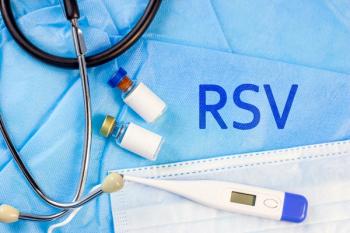
- Drug Topics January 2021
- Volume 165
- Issue 1
Remdesivir in the Treatment of COVID-19
On October 22, 2020, the FDA approved remdesivir (Veklury; Gilead) as the first treatment for coronavirus disease 2019 (COVID-19).
On October 22, 2020, the FDA approved remdesivir (Veklury; Gilead) as the first treatment for coronavirus disease 2019 (COVID-19).1 Remdesivir is now indicated for adult or pediatric patients 12 years of age and older weighing at least 40 kilograms for the treatment of COVID-19 requiring hospitalization. Remdesivir is an inhibitor of the severe acute respiratory syndrome coronavirus-2 (SARS-CoV-2) RNA-dependent RNA polymerase, an essential component of viral replication. Remdesivir, an adenosine nucleotide prodrug, is metabolized into its active form after being distributed into cells, resulting in delayed chain termination during viral RNA replication.2
Efficacy
Approval of remdesivir stemmed from the results of 3 large randomized controlled studies. The largest study was the double-blind, randomized, placebo-controlled ACTT study (NCT04280705).3 The trial enrolled 1062 hospitalized adult patients who met 1 of the following criteria suggestive of lower respiratory tract infection at the time of enrollment: radiographic infiltrates by imaging study, peripheral oxygen saturation (SpO2) less than or equal to 94% on room air, or requiring supplemental oxygen, mechanical ventilation, or extracorporeal membrane oxygenation (ECMO). Participants also had to have a laboratory-confirmed SARS-CoV-2 infection as determined by a positive reverse transcription, polymerase-chain-reaction assay result from any respiratory specimen collected less than 72 hours prior to randomization.3 Five hundred and forty-one participants were randomized to receive remdesivir 200 mg intravenously (IV) on day 1 and then 100 mg IV on days 2 through 10, and 521 participants were randomized to receive placebo.
The primary outcome was the time to recovery based on the first day within the 28 days after treatment initiation that the patient was either not hospitalized or was hospitalized and did not require supplemental oxygen and ongoing medical care (eg, hospitalized for a non-COVID-reason). Participants who received remdesivir had a median time to recovery of 10 days (95% CI, 9-11) compared with 15 days (95% CI, 13-18) in the placebo group (rate ratio for recovery, 1.29; 95% CI, 1.12 to 1.49; P<.001, by a log-rank test). The Kaplan-Meier estimates of mortality by day 15 were 6.7% with remdesivir and 11.9% with placebo and 11.4% with remdesivir and 15.2% with placebo by day 29 (HR, 0.73; 95% CI, 0.52-1.03).
In the second double-blind, randomized control trial GS-5734 (NCT04292730), standard of care was compared with a 5- and 10-day course of remdesivir in evaluating the clinical status of hospitalized patients. Only the 5-day course of remdesivir was shown to be statistically significant at improving patient’s COVID-19 symptoms compared with standard of care when assessed on day 11.1 The third trial (NCT04292899) compared a 5-day course with a 10-day course of remdesivir in hospitalized patients with severe COVID-19. When patients were evaluated on day 14, no significant difference in recovery and mortality rates between the 2 groups was reported.1
Safety
In the ACTT trial, the placebo group experienced more adverse effects than the remdesivir group (31.6% vs 24.6%).2 The most common adverse reactions observed with treatment with remdesivir are nausea (5%), increased aspartate aminotransferase (3%), and increased alanine transaminase (ALT) (2%).3 Hepatic lab testing should be performed in all patients before and while receiving remdesivir. Consider discontinuation if ALT levels increase greater than 10 times the upper limit of normal and discontinue if ALT elevation is accompanied by signs or symptoms of liver inflammation. Avoid coadministration with chloroquine phosphate or hydroxychloroquine sulfate as cellular data has shown reduced antiviral activity.3 Other monitoring parameters include testing estimated glomerular filtration rate and prothrombin time before and throughout treatment.
Dosage and Duration
The current dosage recommendation of remdesivir is a 200 mg IV infusion over 30 to 120 minutes on day 1 followed by a daily 100 mg IV infusion on days thereafter.2 For patients only on supplemental oxygen, the recommended duration is 5 days compared with patients on mechanical ventilation or extracorporeal membrane oxygenation where the recommended duration is 10 days.
Lisa Holle, PharmD, BCOP, FHOPA, FISOPP is an associate clinical professor at UConn School of Pharmacy.
Ryan Nolan is a 2021 PharmD Candidate at UConn School of Pharmacy.
References
1. FDA Approves First Treatment for COVID-19. Press release. FDA; October 22, 2020. Accessed November 19, 2020.
2. Veklury. Prescribing information. Gilead; 2020. Accessed November 19, 2020.
3. Beigel JH, Tomashek KM, Dodd LE. Remdesivir for the treatment of Covid-19 – Final Report. N Engl J Med. 2020;383(19):1813-1826. doi:10.1056/NEJMoa2007764
Articles in this issue
about 5 years ago
A Whirlwind of Change Paves Way for Pharmacy’s Futureabout 5 years ago
OTC Basics for Diabetesabout 5 years ago
Pharmacists Must Unify to Overcome Challenges in Professionabout 5 years ago
Build Career Skills for Pharmacy’s Futureabout 5 years ago
Top Pipeline Drugs on the Horizonabout 5 years ago
ASHP Officials Provide Year-End Review of New Policy Issuesabout 5 years ago
Pharmacist-Led Project Targets Opioid Education and Safetyabout 5 years ago
Pharmacist Tackles Opioid Crisis With Innovative Projectsabout 5 years ago
Pharmacy in 2021: Trends to Transform an Evolving Professionabout 5 years ago
Understanding the COVID-19 VaccineNewsletter
Pharmacy practice is always changing. Stay ahead of the curve with the Drug Topics newsletter and get the latest drug information, industry trends, and patient care tips.




































